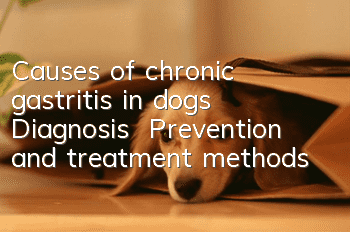Causes of chronic gastritis in dogs | Diagnosis | Prevention and treatment methods

The causes of chronic gastritis in dogs:
The primary pathogenesis is that after the mucosal barrier is destroyed, the immune function of the mucosa is disordered, and exposure to pathogenic substances in the stomach causes the disease. . Irritation factors include repeated exposure to the same pathogens that can cause acute gastritis, as well as ingestion of foreign bodies and stomach parasites.
Diagnostic symptoms of chronic gastritis in dogs:
The most common symptom of this disease is chronic vomiting of different times and characteristics. Since gastritis impairs the motility and emptying of the stomach, Food may remain in the stomach for several hours and is eventually passed into the intestines undigested. Some sick dogs, especially those with eosinophilic gastritis, may vomit blood, show symptoms of abdominal pain from time to time, and often change positions to relieve pain. Dogs that are severely ill or have been ill for a long time may appear haggard.
Diagnostic criteria for canine chronic gastritis:
Various laboratory diagnoses are required to rule out underlying systemic diseases causing chronic vomiting, especially renal or liver disease. Radiography and gastroscopy to roughly examine the appearance of the gastric mucosa can provide more valuable information for diagnosis.
Prevention and treatment measures for canine chronic gastritis:
First of all, the dog should pay attention to the dietary hygiene, avoid overeating, and avoid eating cold, hard, rough, and difficult-to-digest foods. of feed, reducing the high Fatty foods and irritating drugs. Keep warm in winter and when bathing to prevent colds and abdominal cold.
Secondly, for drug treatment, antacids such as Weishuping, cimetidine, and multi-enzyme tablets can be used to aid digestion. Metoclopramide and cholestyramine are suitable for reflux gastritis. Pribus, domperidone, etc. promote gastric emptying. Sucralfate tablets, aluminum hydroxide gel, and vitamins protect the gastric mucosa. protective effect. For Helicobacter pylori, colloidal bismuth and amoxicillin are often used in combination. Metronidazole, furazolidone, berberine, and Smecta, a new digestive tract pathogen elimination and mucosal protective agent, can also be added.
- What to do if your puppy has diarrhea and vomiting? Here are some tips to solve it easily?
- Can a dog's ears that are swollen like air be healed on their own?
- Dog pica treatment, come in and take a look!
- The meaning of dog’s little actions
- Identifying colds in dogs
- How often do you need to deworm your dog in summer?
- The dog is jumping and barking excitedly? Teach you how to correct in 30 minutes
- How to improve dog food protection, dog food protection training methods!
- What's going on with golden retrievers having blood in their stools?
- How to detect internal and external parasites in your pet promptly and effectively?



